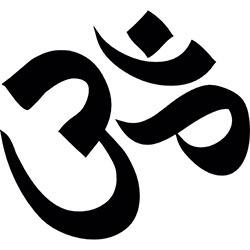Hinduism is the official religion of india and one of the oldest religious traditions on record. It is the third largest religion in the world, second only to Christianity and Islam.
One of the main characteristics of Hinduism is the division of Indian society by caste. They are Hindu social groups, composed separately of brahmins (priests), xatrias (warriors), vais (merchants), sudras (workers) and outside the social structure there are still outcasts, also called untouchables.
Hinduism is more than a religion, it configures an entire Indian cultural universe, with a direct impact on local society and policies.
Also called Sanatana Dharma, a Sanskrit expression meaning "perpetual law".
Learn more about the meaning of Dharma.
 The main visual symbol of Hinduism is the Om or Aum, the primordial sound. Used in vocalizations, meditations and mantras, it consists of three Sanskrit letters and combined make the sound of om or aum. Om represents the deity of creation, Brahma.
The main visual symbol of Hinduism is the Om or Aum, the primordial sound. Used in vocalizations, meditations and mantras, it consists of three Sanskrit letters and combined make the sound of om or aum. Om represents the deity of creation, Brahma.
Hinduism does not have an integrated belief system and not a single holy book, although it uses the Vedic, the sacred texts of the Vedic tradition, as a reference. Hindu culture incorporates a number of Vedic customs and traditions and later even Christian, Islamic, and other Eastern philosophies such as Buddhism.
Hindu practices and rituals vary by region, but most followers perform at least one ritual daily, such as the puja, which is an offering to the gods. Hindu practices include yoga, tantra and meditation as ways of harmonizing the energy between body and mind. The chanting of mantras is part of the rituals, just as it is routine for Hindus to perform the worship at dawn, purification rituals and pilgrimages to sacred places such as the Ganges River in India.
Learn more about yoga.
gods of Hinduism
The gods of Hinduism are actually bodily representations, the avatars, of the supreme deity Brahman. There are hundreds of thousands of avatars worshiped by Hindus, among the best known are the following:
- Krishna - One of the main deities of Hinduism is Krishna, the representative of the manifestations of the Supreme God.
- Shiva - one of the supreme gods of Hinduism and considered the creator of Yoga, is the god of destruction and regeneration. It is part of Trimurti, a Hindu correlation with the Holy Trinity.
- Brahma - the god of creation of the universe in Hindu belief. He is also part of Trimurti.
- Vishnu - the god of preservation, one of the three elements of the trinity of Trimurti.
- Ganesha - god of fortune and riches, is son of Shiva with wife Parvati.
Origin of Hinduism
The origin of Hinduism is not exact, but it is known that it began to form from the Vedic traditions millennia before Christianity.
The Vedas are sacred texts written by the Aryan people, who inhabited what is now Iran in 1500 BC. It is from these Vedic customs that Hinduism arises.
Muslim invasions of the region in the eleventh century caused Islam to influence Hindu doctrine.
Until the British domination of India in the nineteenth century also changed the Hindu culture, causing a break from the more traditional customs to a new, more modern Hinduism. New Hindu schools, lines and sects appear.
Hinduism in Brazil
The Hindu community is small in Brazil, smaller than the Buddhists. The main expression of Hinduism in Brazil is the Hare Krishna movement.
Hinduism and Buddhism
Buddhism had greater expression, at first, in China, and Hinduism is an Indian tradition. While Hinduism is based on the Vedic sacred texts, Buddhist belief comes from the teachings developed by the Buddha during his path to enlightenment.
The two traditions share the concepts of karma and dharma, but with different goals. Buddhists seek the nirvana symbolized by the permanent state of peace and work towards eternal happiness. And Hindus attain moksha, a concept similar to nirvana, only through knowledge of religious doctrine, guided by the gods.
Both Hindu and Buddhist cultures believe that there are previous incarnations, so one must be aware of behavior in life so as not to return under an inferior form in the next. Both also believe in the practice of Yoga as a way to achieve spiritual evolution.
Learn about other religions:
- Buddhism
- Islam
- Judaism
- Taoism
- spiritism
